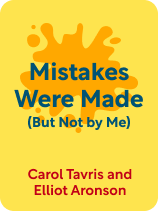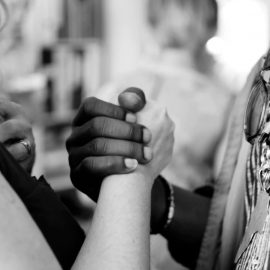

This article is an excerpt from the Shortform book guide to "Mistakes Were Made (But Not by Me)" by Carol Tavris and Elliot Aronson. Shortform has the world's best summaries and analyses of books you should be reading.
Like this article? Sign up for a free trial here.
What is memory distortion? Can we change our memories?
In Mistakes Were Made (But Not by Me), Carol Tavris and Elliot Aronson say that one way we overcome cognitive dissonance is through memory distortion. This is when we falsely remember information and events to put ourselves in a good light.
Continue reading to learn more about memory distortion.
What Is Memory Distortion?
A cognitive process we use to overcome dissonance is memory distortion. But what is memory distortion? The authors argue that memories frequently offer unreliable and inaccurate accounts of our experiences. Usually, our brains adjust memories to put us in the best possible light. We remember details that fit our current self-image and forget information that contradicts it. The more important a memory is to your self-image, the more likely you are to remember it in a self-serving way.
(Shortform note: Tavris and Aronson emphasize the fallibility of memory, but others argue that we should acknowledge the extensive capabilities of our memories as well. Because instances of distorted memories are more noteworthy and concerning, we pay more attention to them and therefore have trouble recognizing how accurate our memories are every day. We’re able to recall countless pieces of information, like people’s names, the birthdays of loved ones, song lyrics, directions, and important events in our lives.)
Memories are naturally fluid because of the way our brains organize information—every time we retrieve a memory, our brains reconstruct the details to fit into a cohesive narrative. Over time, memories can shift so much that they’re unrecognizable compared to the actual event.
(Shortform note: Why do our brains store memories in narrative form? Neurologists claim that it suits our brain’s love of patterns: It creates a clear map on which our brains can overlay new information, using the structure of beginning, problem, resolution, and ending. Additionally, we typically learn this structure early on when our families and our teachers read stories to us, creating a foundational pattern for memory retention in early development. Throughout our lives, we therefore retain information in narrative form, the potential negative consequence of that being our tendency to forget information that doesn’t fit the narrative.)
Memory distortion isn’t always for the purpose of self-justification, the authors note, but it often complements that process—it allows us to forget or misremember bad choices we’ve made. These bad choices would otherwise create dissonance by threatening our belief that we’re honest, competent, good, and so on. By misremembering our negative actions in a way that benefits us, we reduce the dissonance they create.
For example, let’s say you pride yourself on being intelligent, diligent, and detail-oriented, but you make a costly mistake on a work assignment. As you recall the event over time, your brain may distort the memory and attribute blame for the mistake to someone else, resolving the uncomfortable dissonance that arises when your belief in your competence is threatened.
How Social Interactions Shape Memories
While Tavris and Aronson highlight that we’re more likely to misremember an event if the facts surrounding the situation contradict our self-image, another arguably important contributing factor to memory distortion is our interactions with other people. When we talk to other people about a memory, they introduce new interpretations that influence how we recall the event. Sometimes, we integrate entirely false information from social sources into our memories. This effect stems from a psychological phenomenon called social contagion, where behaviors and attitudes spread from one member to another in a group.
In one study, participants were given a list of words to memorize and were then brought together to recall the words on their respective lists (which weren’t identical). Instead of pointing out when other group members offered words that weren’t on their list, participants were likely to falsely report that they remembered seeing those words too. Hearing what other people said changed their recollection. Therefore, if you’re trying to accurately recall an event in your life, remember everything you can about it before talking to others.

———End of Preview———
Like what you just read? Read the rest of the world's best book summary and analysis of Carol Tavris and Elliot Aronson's "Mistakes Were Made (But Not by Me)" at Shortform.
Here's what you'll find in our full Mistakes Were Made (But Not by Me) summary:
- Why we feel discomfort when we act in a way that doesn't align with our values
- How patterns of self-justification can cause our beliefs to diverge sharply from other people’s
- How we can break the cycle of self-justification and hold ourselves accountable






